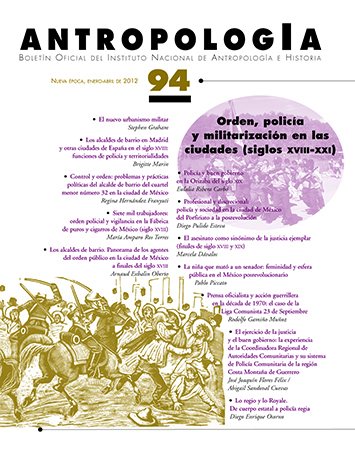Artículos
Published 2012-04-30
Keywords
- Imperialismo global,
- control y vigilancia,
- poder,
- biopolítica,
- Estado
- ...More
How to Cite
El nuevo urbanismo militar. (2012). Antropología. Revista Interdisciplinaria Del INAH, 94, 6-18. https://revistas.inah.gob.mx/index.php/antropologia/article/view/2695
Abstract
Uno tiende a olvidar que la mayoría de las ciudades del mundo se edificaron, al menos en parte, como construcciones militares. La historia de cómo los espacios urbanos se planearon, levantaron y habitaron no puede ser contada sin considerar el papel central del poder y el control. Antes y después de la era moderna, las ciudades y las ciudades-Estado fueron, al mismo tiempo, los agentes y blancos de los conflictos; el saqueo y la matanza de sus habitantes, fortificados, era el evento central de toda guerra.
Downloads
Download data is not yet available.
References
Agamben, Giorgio, Homo Sacer, Valencia, Pre-Textos, 2009.
- Agamben, Giorgio, “Security and Terror”, en Theory and Event, vol. 5, núm. 4, 2002, pp. 1–2.
- Berman, Marshall, “Falling Towers: City Life After Urbicide”, en Dennis Crow (ed.), Geography and Identity, Washington, Maisonneuve, pp. 172-192.
- Blackmore, Tim, War X: Human Extensions in Battlespace, Toronto, University of Toronto Press, 2005.
- Braudel, Fernand, Capitalism and Material Life, Nueva York, Harper and Row, 1973.
- Bugaerd, escribió el primer manual occidental de guerra urbana: La guerre des rues et des maisons (La guerra de calles y casas), reimpresa en París, por Jean-Paul Rocher, 1997.
- Cato, “The Weaponization of Immigration”, Center for Immigration Studies, February 2008 [http://www.cis.org/weaponization_of_immigration.html].
- Davis, Mike, “The Urbanization of Empire: Megacities and the Laws of Chaos”, en Social Text, vol. 22, núm. 4, Winter, 2004.
- Davis, Mike, Dead Cities and Other Tales, Nueva York, New Press, 2003.
- Derek, Gregory, The Colonial Present, Oxford, Blackwell, 2004.
- Dikeç, Mustafa, Badlands of the Republic: Space, Politics and Urban Policy, Oxford, Blackwell, 2007.
- Diken, Bülent y Carsten Bagge Laustsen, The Culture of Exception: Sociology Facing the Camp, Londres, Routledge, 2005, p. 64.
- Driver, Felix y David Gilbert (eds.), Imperial Cities, Manchester, Manchester University Press, 2003.
- Foucault, Michel, Society Must Be Defended: Lectures at the Collège de France, 1975–1976, Londres, Allen Lane, 2003, p. 103.
- Giddens, Anthony, The Nation-State and Violence, Cambridge, Polity, 1985.
- Goonewardena, Kanishka y Stefan Kipfer, “Postcolonial Urbicide: New Imperialism, Global Cities And The Damned Of The Earth”, en New Formations, núm. 59, Autumn 2006, pp. 23-33.
- Graham, Stephen y Simon Marvin, Splintering Urbanism, Londres, Routledge, 2001.
- Gravett, C., Medieval Siege Warfare, Oxford, Osprey, 1990.
- Harvey, David, The New Imperialism, Oxford, Oxford University Press, 2005.
- Howell, Sally y Andrew Shryock, “Cracking down on Diaspora: Arab Detroit and America’s ‘war on terror’”, en Anthropological Quarterly, núm. 76, pp. 443-462.
- Huntington, Samuel, The Clash of Civilizations and the Remaking of World Order, Nueva York, Simon & Schuster, 1998.
- Huntington, Samuel, Who Are We: The Challenges to America’s National Identity, Nueva York, Simon & Schuster, 2005.
- King, Anthony, Urbanism, Colonialism, and the World Economy, Londres, Routledge, 1990.
- Kipfer, Stefan y Kanishka Goonewardena, “Colonization and the New Imperialism: On the Meaning of Urbicide Today”, en Theory and Event, vol. 10, núm. 2, 2007, pp. 1-39.
- Kobe, Nicole, ‘Government Announces that half of £1.2 billion in funding for Technology to Boost Border Security will go to Raytheon-led Trusted Borders Consortia for a Screening System”, en IT Pro, núm. 14, november, 2007 [http://www.itpro. co.uk/139053/650-million-e-borders-contract-to-raytheon-group].
- Lefebvre, Henri, Everyday Life in the Modern World, Londres, Continuum, 2002.
- Lind, William, “Understanding Fourth Generation War”, en Military Review, septiembre-octubre 2004, p. 16 [www.au.af.mil/au/awc/awcgate/milreview/lind.pdf ].
- Mesnard y Méndez, Pierre, “Capitalism Means/Needs War”, en Socialism and Democracy. Online, vol. 22, núm. 2, 2002 [http:// www.sdonline.org/32/capitalism_means_needs_war.htm].
- Mills, Mark y Peter Huber, “How Technology Will Defeat Terrorism”, en City Journal, Winter 2002 [http://www. city-journal.org/html/12_1_how_tech. html].
- Mitchell, Tim “The Stage of Modernity”, en Tim Mitchell (ed.), Questions of Modernity, Minneapolis, University of Minnesota Press, 2000, pp. 1–34.
- Mumford, Lewis, The City in History, Nueva York, MJF Books, 1961.
- Ross, Kristin, Fast Cars, Clean Bodies: Decolonization and the Reordering of French Culture, Cambridge, MIT Press, 1996, p. 12.
- Sengoopta, Chandak, Imprint of the Raj: How Fingerprinting Was Born in Colonial India, Londres, Pan Books, 2003.
- Shaw, Martin, War and Genocide, Cambridge, Polity, 2003.
- Veracini, Lorenzo, “Colonialism Brought Home: On the Colonization of the Metropolitan Space”, en Borderlands, vol. 4, núm. 1, 2005 [http://www.borderlands.net.au].
- Weber, Max, The City, Glencoe, Free Press, 1958.
- Weizman, Eyal, entrevista con Phil Misselwitz, “Military Operations as Urban Planning”, en Mut Magazine, August, 2003 [http://www.metamute.org/?q=en/node/6317].
- Weizman, Eyal, “TheWar of Streets and Houses”, en Cabinet Magazine, núm. 22, Summer 2006 [http://www.cabinetmagazine. org/issues/22/bugeaud.php].

